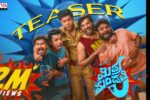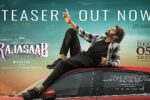Retro (2025) Movie Review: Exploring Director Karthik Subbaraj’s Vision
Introduction
‘Retro’ (2025) is a neo-noir Tamil gangster romance that boldly fuses nostalgia with cinematic ambition. Directed by Karthik Subbaraj, this film stars Suriya and Pooja Hegde in a gripping story that traverses time and emotions. With buzz from platforms like iBomma Movies, Bappamtv Movies, and Iradha Movies, the movie has garnered praise for its inventive storytelling and technical brilliance.
Director’s Previous Works & Stylistic Evolution
Karthik Subbaraj, known for films like *Jigarthanda*, *Petta*, and *Mahaan*, brings his signature flair—stylized violence, complex characters, and nonlinear narratives—to *Retro*. However, this film marks a matured evolution in his storytelling.
Where earlier works focused on isolated character arcs, *Retro* integrates personal emotion with a sweeping, romanticized gangster saga, elevating the film to a more universal scale.
Vision Behind the Film
Subbaraj’s vision for *Retro* appears to be a tribute to vintage cinema aesthetics, merged with contemporary themes of love, loss, and vengeance. He balances old-school storytelling with modern visual grammar, resulting in a movie that feels both nostalgic and fresh.
The intent was clearly to explore dualities—softness within violence, love within chaos, and memory within present-day consequences.
Narrative & Storytelling Style
The nonlinear narrative jumps between past and present, revealing emotional depth in a gangster’s life. This approach keeps the audience emotionally invested while allowing for suspenseful pacing.
Symbolism plays a large role—mirrors, music records, and clocks become narrative devices. The screenplay is dense but rewarding, reflecting Subbaraj’s bold narrative ambition.
Character Depth and Motivation
Each character in *Retro* is purposefully layered. Suriya’s Paari is a man of contradictions—loyal yet violent, sensitive yet ruthless. Pooja Hegde’s Rukmini is not a mere romantic foil but a moral anchor in the narrative.
Supporting characters receive brief but impactful arcs, supporting Subbaraj’s philosophy that no role is insignificant in shaping the story’s core.
Use of Visual Language
Visual storytelling is central to Subbaraj’s approach. He employs light and shadow to signify moral ambiguity and inner conflict. The frequent use of warm sepia tones evokes a sense of longing for the past.
The camera movements—long takes, slow zooms, and cross-cut montages—enhance the thematic layering without overwhelming the viewer.
Music as Narrative Tool
Santhosh Narayanan’s music isn’t just background—it’s narrative. Subbaraj uses music to signify turning points. “Kanimaa” underscores a crucial romantic memory, while “Kannadi Poove” reveals a tragic emotional pivot.
This integration aligns with Subbaraj’s history of treating music as a dramatic element, not just filler.
Critical Directional Decisions
| Aspect | Decision | Impact |
|---|---|---|
| Non-linear Timeline | Frequent time jumps | Enhances suspense and emotional layering |
| Visual Motifs | Mirrors, clocks, old records | Provides symbolism and emotional weight |
| Genre Fusion | Gangster + Romance + Drama | Creates broader emotional appeal |
Comparative Analysis
Compared to *Jigarthanda* or *Petta*, *Retro* feels more personal and emotionally rooted. While those films leaned into genre conventions, *Retro* transcends them with a narrative that’s both intimate and operatic.
Bappamtv Movies observed that this may be Subbaraj’s most heartfelt film to date, and Iradha Movies called it “a culmination of his directorial philosophy.”
Director’s Influence on Cast and Crew
Suriya reportedly worked closely with Subbaraj to refine his character’s layered emotional beats. Pooja Hegde adapted her performance style to match Subbaraj’s preference for naturalistic acting amidst heightened stakes.
The crew—particularly cinematographer Shreyaas Krishna and editor Vivek Harshan—were instrumental in realizing Subbaraj’s precise vision, proving how a unified directorial force can elevate every department.
Strengths and Weaknesses of Direction
| Strengths | Weaknesses |
|---|---|
| Deep character development | Overcomplicated narrative structure at times |
| Symbolic visual storytelling | Requires viewer patience to unravel layers |
| Unique blending of genres | Pacing slightly uneven in the second half |
Star Rating for Direction
| Criteria | Rating (Out of 5) |
|---|---|
| Vision & Concept | 5.0 |
| Narrative Execution | 4.5 |
| Actor Direction | 4.5 |
| Visual Language | 5.0 |
| Innovation | 4.5 |
Overall Direction Rating: 4.7/5
Final Verdict
Karthik Subbaraj’s *Retro* is a masterclass in ambitious direction. It’s a richly layered, emotionally resonant, and visually compelling film that stands out not just in Tamil cinema, but across Indian filmmaking in 2025.
It’s a film best appreciated when viewed through the lens of directorial vision, and it’s a must-watch for cinephiles and Subbaraj fans alike.
FAQs
Is Retro one of Karthik Subbaraj’s best films?
Yes, many critics and fans consider it his most emotionally and visually ambitious work yet.
What makes the direction in Retro stand out?
The blending of visual symbolism, nonlinear storytelling, and emotional depth marks it as unique.
How involved was Karthik Subbaraj in the film’s aesthetics?
He had significant input in cinematography, editing, and set design to ensure his vision was fully realized.
Is Retro a typical gangster movie?
No, it combines gangster elements with romance and personal drama, making it multidimensional.
How does the direction compare to Subbaraj’s earlier films?
Retro is more mature and emotionally focused, showcasing growth in his directorial style.



